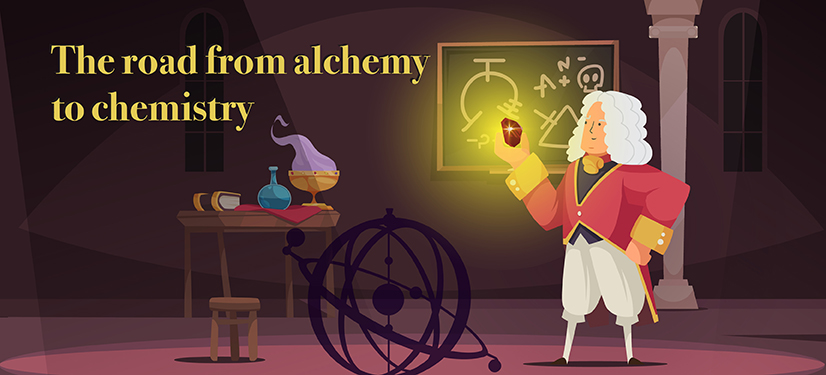
Whales evolved from tiny deer-like animals, mussels could start filtering ocean waste, pyjamas became popular during World War 1 – when it comes down to it, there are some shocking connections between people, places and things in the world around us. But no matter how varied your knowledge of trivia is, we doubt you have heard of the connection we’re about to tell you of next!
Did you know the famed physicist and father of gravity, Isaac Newton, is connected to the boy wizard Harry Potter?
No joke! Even stranger is the source of the connection between them – the Philosopher’s Stone!
How is the world’s most famous physicist tied to a fabled legend? Let’s find out.
Long after he put forth his law of gravitation and entered the annals of history, a large chunk of Isaac Newton’s work still remained unpublished. While he passed away in the year 1727, his family held on to his scientific manuscripts until 1936, over two hundred years after his death!

Portrait of Isaac Newton. Image source: Wikimedia Commons
When they started releasing these documents many museums and scientific institutions auctioned to collect them. These manuscripts were essentially Newton’s experiments and theories about the nature of science. Hidden in these archives was a recipe for the Philosopher’s Stone. However, contrary to what you may think, it wasn’t uncommon for a scientist in the 17th century, like Newton, to be preoccupied with it. Here’s why.
While terms like the “Philosopher’s Stone” are more common in works of fantasy fiction like Harry Potter, for a long time, scientists around the world thought the Stone was real. You see it’s important to remember that science in the 17th or 18th century was very different from the science we know now.

The Philosopher’s Stone prop used in the Harry Potter movies. Image source: Wikimedia Commons
Back then, scholars did not have the technology to unravel the nature of our universe like we do today. This was especially true for chemistry. In the absence of resources, scientists had to make an educated guess about the nature of elements, compounds and how they work together. In fact, back then, this sort of study wasn’t even called chemistry – it was called alchemy.
Yet another term that is now associated with fantasy, alchemy was the subject in which scientists, a few centuries ago, studied the nature of substances (something that we would today do in chemistry). But since their knowledge on the topic was limited, a lot of the time their guesses and hypotheses were way off the mark. For example, one of the central pursuits in alchemy was turning metals into gold. Alchemists (people who practised alchemy) thought that with a substance, called the Philosopher’s Stone, they could change the structure of any base metal and turn it into gold.

Portrait of Robert Boyle. Image Source: Wikimedia Commons
Newton wasn’t the only famous scientist from this era who believed this. In fact, Robert Boyle, best known for Boyle’s law in chemistry, was also said to be an alchemist who believed that the Philosopher’s Stone could exist!
When Newton’s unpublished work came to light, a recipe to make the Philosopher Stone’s was found within. Historians speculate that this might not have been Newton’s own recipe but one copied from a fellow scientist.
Years later, as we made more breakthroughs and scientific discoveries, alchemy and its many principles were disproved – we now know once and for all that the Philosopher’s Stone doesn’t exist.
While the similarities between our world and Harry Potter’s ends here, it’s important to remember that it’s because of scientists like Newton who pushed boundaries that we know what we know today. While alchemy is no longer considered a science, more historians and scientists agree that if it wasn’t for people like Newton who continued to pursue it in a systematic way, we may never have arrived at modern-day chemistry.
Liked this? Read more here!
Check out this post on the Rarest Elements on Earth
Today in Evolution: Elephants Lose Their Tusks!
Deepthi is an ambivert who is on a steady diet of good food, filter coffee, and self-improvement. Being an ardent reader, storytelling has been her first love and she enjoys exploring how to convey stories compellingly. Having studied psychology and experienced the learning and development field, Deepthi is driven to understand human behavior and to know what makes each of us unique. You are most likely to find her tucked into a cozy corner at a local cafe with a Kindle or a book in hand. If you find her there, stop by and say hello, she'd be eager to learn your story too. Until then, you can ping her at storyweavers@byjus.com for anything you may like to share.
Comments
Lavya
August 25, 2021
Amazing